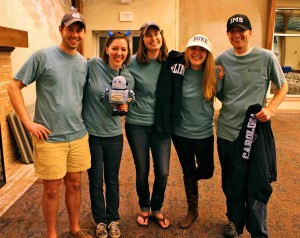North Carolina Sea Grant has a strong tradition of teaching the teachers about all things marine science – thus multiplying the impacts as each teacher reaches more students.
On Sept. 13, we will cosponsor a lesson planning workshop in Raleigh for scientists, who will share those lessons with dozens of educators during a Nov. 13 event at the N.C. Museum of Natural Sciences.  The educators, in turn will bring the lessons to classrooms, museums, aquariums and other learning centers. In grant funding terms, that is an example of “broader impacts” of research.
The educators, in turn will bring the lessons to classrooms, museums, aquariums and other learning centers. In grant funding terms, that is an example of “broader impacts” of research.

Graduate students from UNC Chapel Hill and Duke University lead SciREN. Photo by Kerry Irish, UNC-CH.
We can’t wait to do that math to identify how many students will be reached. What a great return for our investments in SciREN – the Scientific Research and Education Network that was organized by marine science graduate students who attended a workshop from the Centers for Ocean Sciences Education Excellence SouthEast in 2012.
Sea Grant programs in the Carolinas and Georgia were key partners in COSEE SE and the workshops known as a REEF, or Researcher Educator Exchange Forum. I was pleased to help organize panels that shared perspectives from media, public information officers and a funding agency. North Carolina Sea Grant provided additional funding to help pilot the resulting local communities of practice in our coastal region and in Raleigh, each bringing together researchers with classroom teachers and nonformal educators.
Our marine educator Terri Kirby Hathaway participated in SciREN’s first two coastal workshops, along with researchers, and representatives from agencies and nonprofits.
You may have read Coastwatch stories about REEF and SciREN last year. And we will have a follow-up story, written by one of the SciREN founders, in the autumn issue of Coastwatch that is at the printer.
In the meantime, share this post with scientists who may want to join the lesson planning workshop on Sept. 13 – slots are filling fast! They then will fine tune the lessons to share Nov. 13 at SciREN Triangle.
Registration also is open for educators who want to come meet the scientists who do the North Carolina research that provides the data that fill the lesson plans that match grade-specific class requirements that the teachers can use to engage students with real world topics. Whew. Those are some connections.
Thanks again to the SciREN team who embraced the COSEE SouthEast and REEF concepts and created their own organization that continues to grow. Several of these graduate students work on research projects funded by North Carolina Sea Grant, so we are proud on multiple counts.
We will be watching for tweets from the lesson planning workshop and SciREN Triangle. And then it is back to the coast for SciREN 2015!
Learn more at www.thesciren.org and follow the team on Twitter as @SciREN_outreach.
Also follow @ncsg_katiem, @TerriKHNC and @SeaGrantNC on Twitter. And look for North Carolina Sea Grant on Facebook.